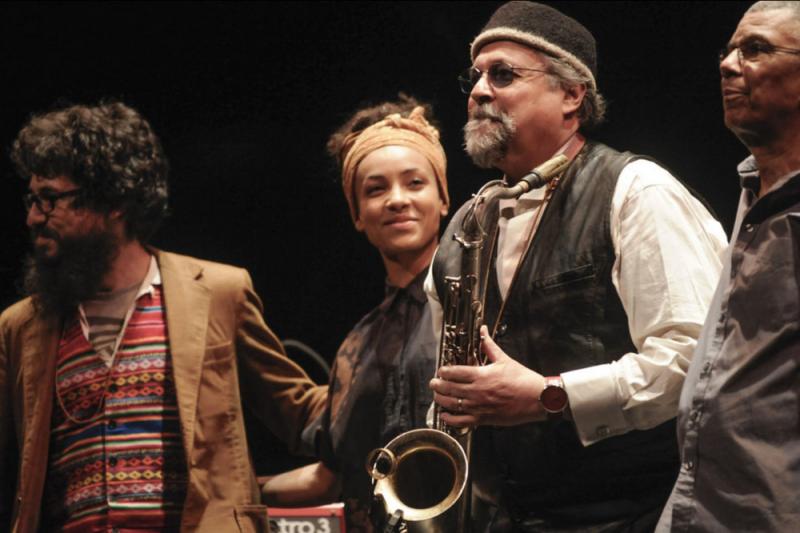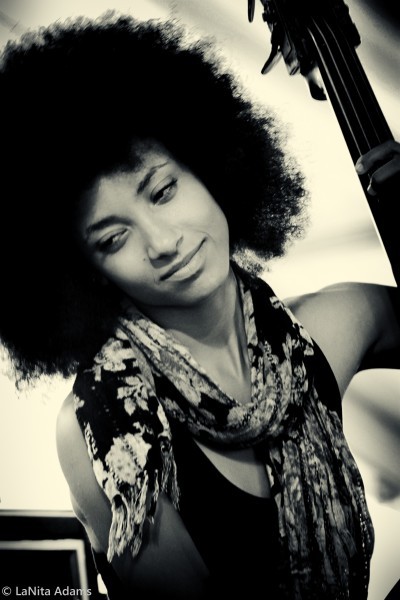Spring Quartet, Barbican | reviews, news & interviews
Spring Quartet, Barbican
Spring Quartet, Barbican
Multi-generational jazz supergroup plays likeable set of expansive, freewheeling tunes

In the 1960s and early 70s drummer Jack DeJohnette, now 71, was learning his craft with nearly everyone who was anyone, including Coltrane, Monk, Keith Jarrett and Miles Davis.
There was plenty of spring in the sense of bounce in the music, too. The first piece, Lovano’s “Spring Day”, was an expansive, freewheeling rampage, ideas flying out like sparks from a roaring fire, as Spalding, Lovano and Genovese all charmed the room with their gregarious solo work, all held together by DeJohnette’s deliciously light touch. Of the four, DeJohnette had the least solo time, but, as the best professionals will, he made his expert flexibility seem effortless.
Lovano, who on either tenor or soprano saxophone had easily the most penetrating sound, was jousting with spears of melody, his distinctively muscular tone massaging the group’s sound, then occasionally softening into a Lester Young caress. His soprano sang a lovely duet with Spalding in her own vocal composition “Hystaspes Shrugged”, a world- and folk-influenced song of yearning vocalisation that allowed both performers to show off their honeyed delicacy.
The sound was mainly acoustic: Genovese had a battery of keyboards, but mostly played the piano, clearly relishing its full reverberation, while Spalding made a lovely, resonant, elastic sound on the double bass. It was almost classical in timbre, without the attack of Mingus or any electronic effects, but her technical control and harmonic imagination during long solo passages filled the Barbican hall with round, golden, swinging phrases.
That’s the thing with spring: what comes up generally looks quite similar to what was there the year before
Compositions were spread around the group, though here (if not elsewhere), deference was paid to experience: Lovano had three, DeJohnette two, and the youngsters one apiece. Intriguingly, the two younger players’ pieces were more melodic and accessible to an audience unfamiliar with the last 30 years of jazz idiom. (Opinion on whether that’s a promising or depressing sign will vary.) Genovese’s piece “The Ethiopian Blues” had bursts of a kind of fragmented stride piano. At other times he produced a virtual hailstorm of notes, and generally, like Spalding, preferred an almost classically pure sound. The least well known of the quartet, he impressed with an exceptionally fluent technique, seemingly able to deploy phrases from the full extent of jazz piano history.
The originality on display was not so much any technical breakthrough as the sheer skill and variety of their playing, and the creative endurance with which ideas span endlessly off one another. Presumably, a decision has been taken to eschew the unmelodic avant-garde: you don’t fill halls from San Francisco to Istanbul without tunes. But that’s not in any way to diminish the quality of what there was. That’s the thing with spring: what comes up generally looks quite similar to what was there the year before, but it’s fresh and beautiful all the same.
The future of Arts Journalism
You can stop theartsdesk.com closing!
We urgently need financing to survive. Our fundraising drive has thus far raised £49,000 but we need to reach £100,000 or we will be forced to close. Please contribute here: https://gofund.me/c3f6033d
And if you can forward this information to anyone who might assist, we’d be grateful.

Subscribe to theartsdesk.com
Thank you for continuing to read our work on theartsdesk.com. For unlimited access to every article in its entirety, including our archive of more than 15,000 pieces, we're asking for £5 per month or £40 per year. We feel it's a very good deal, and hope you do too.
To take a subscription now simply click here.
And if you're looking for that extra gift for a friend or family member, why not treat them to a theartsdesk.com gift subscription?
more New music
 Album: Rise Against - Ricochet
Have the US punk veterans finally run out of road?
Album: Rise Against - Ricochet
Have the US punk veterans finally run out of road?
 Music Reissues Weekly: The Final Solution - Just Like Gold
Despite their idiotic name, these San Francisco psychedelic pioneers sounded astonishing
Music Reissues Weekly: The Final Solution - Just Like Gold
Despite their idiotic name, these San Francisco psychedelic pioneers sounded astonishing
 Mogwai / Lankum, South Facing Festival review - rich atmospheres in a south London field
Two polished performances and an embarrassment of instruments
Mogwai / Lankum, South Facing Festival review - rich atmospheres in a south London field
Two polished performances and an embarrassment of instruments
 Album: Alison Goldfrapp - Flux
The synth diva in her comfort zone - maybe getting a little too comfortable, though
Album: Alison Goldfrapp - Flux
The synth diva in her comfort zone - maybe getting a little too comfortable, though
 Album: The Black Keys - No Rain, No Flowers
Ohio rockers' 13th album improves on recent material, but still below mainstream peak
Album: The Black Keys - No Rain, No Flowers
Ohio rockers' 13th album improves on recent material, but still below mainstream peak
 Wilderness Festival 2025 review - seriously delirious escapism
A curated collision of highbrow hedonism, surreal silliness and soulful connection
Wilderness Festival 2025 review - seriously delirious escapism
A curated collision of highbrow hedonism, surreal silliness and soulful connection
 Album: Ethel Cain - Willoughby Tucker, I'll Always Love You
Relatively straightforward songs from the Southern Gothic star - with the emphasis on 'relatively'
Album: Ethel Cain - Willoughby Tucker, I'll Always Love You
Relatively straightforward songs from the Southern Gothic star - with the emphasis on 'relatively'
 Album: Black Honey - Soak
South Coast band return with another set of catchy, confident indie-rockin'
Album: Black Honey - Soak
South Coast band return with another set of catchy, confident indie-rockin'
 Album: Molly Tuttle - So Long Little Miss Sunshine
The US bluegrass queen makes a sally into Swift-tinted pop-country stylings
Album: Molly Tuttle - So Long Little Miss Sunshine
The US bluegrass queen makes a sally into Swift-tinted pop-country stylings
 Music Reissues Weekly: Chip Shop Pop - The Sound of Denmark Street 1970-1975
Saint Etienne's Bob Stanley digs into British studio pop from the early Seventies
Music Reissues Weekly: Chip Shop Pop - The Sound of Denmark Street 1970-1975
Saint Etienne's Bob Stanley digs into British studio pop from the early Seventies
 Album: Mansur Brown - Rihla
Jazz-prog scifi mind movies and personal discipline provide a... complex experience
Album: Mansur Brown - Rihla
Jazz-prog scifi mind movies and personal discipline provide a... complex experience
 Album: Reneé Rapp - Bite Me
Second album from a rising US star is a feast of varied, fruity, forthright pop
Album: Reneé Rapp - Bite Me
Second album from a rising US star is a feast of varied, fruity, forthright pop

Add comment